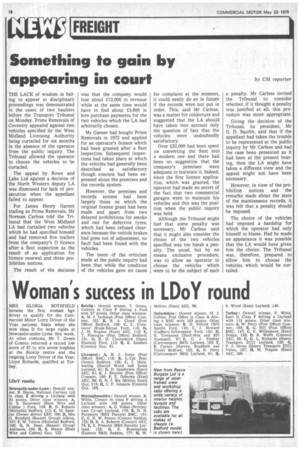Something to gain by appearing in court
Page 20

If you've noticed an error in this article please click here to report it so we can fix it.
by CM reporter THE LACK of wisdom in failing to appear at disciplinary proceedings was demonstrated in the cases of two hauliers .before the Transport Tribunal on Monday. Prims Removals of Coventry appealed against two vehicles specified by the West Midland Licensing Authority being curtailed for six months in the absence of the operator from the public inquiry. The Tribunal allowed the operator to choose the vehicles to be curtailed.
The appeal by Rowe and Lake Ltd against a decision of the North Western deputy LA was dismissed for lack of prosecution when the appellant failed to appear.
For James Henry Garner trading as Prims Removals, Mr Norman Carless told the Tribunal that the West Midland LA had curtailed two vehicles which he had specified himself and had removed five trailers from the company's 0 licence after a fleet inspection as the result of an application for licence renewal and three prohibition notices.
The result of the decision was that the company would lose about £12,000 in revenue while at the same time would have to find about £3,600 in hire purchase payments for the two vehicles which the LA had arbitrarily chosen.
Mr Garner had bought Prims Removals in 1972 and applied for an operator's licence which had been granted after a fleet inspection. Subsequent inspections had taken place at which the vehicles had generally been described as satisfactory though concern had been expressed about the premises and the records system.
However, the premises and records system had been largely those an which the original licence grant had been made and apart from two delayed prohibitions for smoke and one for defective tyres, which had been refused clearance because the vehicle brakes had gone out of adjustment, no fault had been found with the vehicles.
The tenor of the criticism made at the public inquiry had been that while the condition of the vehicles gave no cause for complaint at the moment, it could easily do so in future if the records were not put in order. This, said Mr Carless, was a matter for conjecture and suggested that the LA should have taken into account only the question of fact that the vehicles were undoubtedly satisfactory.
Over £32,000 had been spent on converting the fleet into a modern one and there had been no suggestion that the company's premises were adequate to maintain it. Indeed, since the first licence application, which was granted, the operator had made no secret of the fact that two commercial garages were to maintain his vehicles and this was the posi tion when the public inquiry was held.
Although the Tribunal might feel that some penalty was necessary, Mr Carless said that it might also consider the choice of the two vehicles specified was too harsh a penalty. The usual, but by no means exclusive procedure, was to allow an operator to choose the vehicles which were to he the subject of such a penalty. Mr Carless invited the Tribunal to consider whether, if it thought a penalty was justified at all, this procedure was more appropriate.
Giving the decision of the Tribunal, its president, Mr G. D. Squibb, said that if the appellant had taken the trouble to be represented at the public inquiry by Mr Carless and had the case been presented as it had been at the present hearing, then the LA might have taken a different view and the appeal might not have been necessary.
However, in view of the prohibition notices and the remarks made about the state of the maintenance records, it was felt that a penalty should be imposed.
The choice of the vehicles had imposed a hardship for which the operator had only himself to blame. Had he made an appearance it was possible that the LA would have given him the choice. The Tribunal was, therefore, prepared to allow him to choose the vehicles which would be curtailed.






























































































